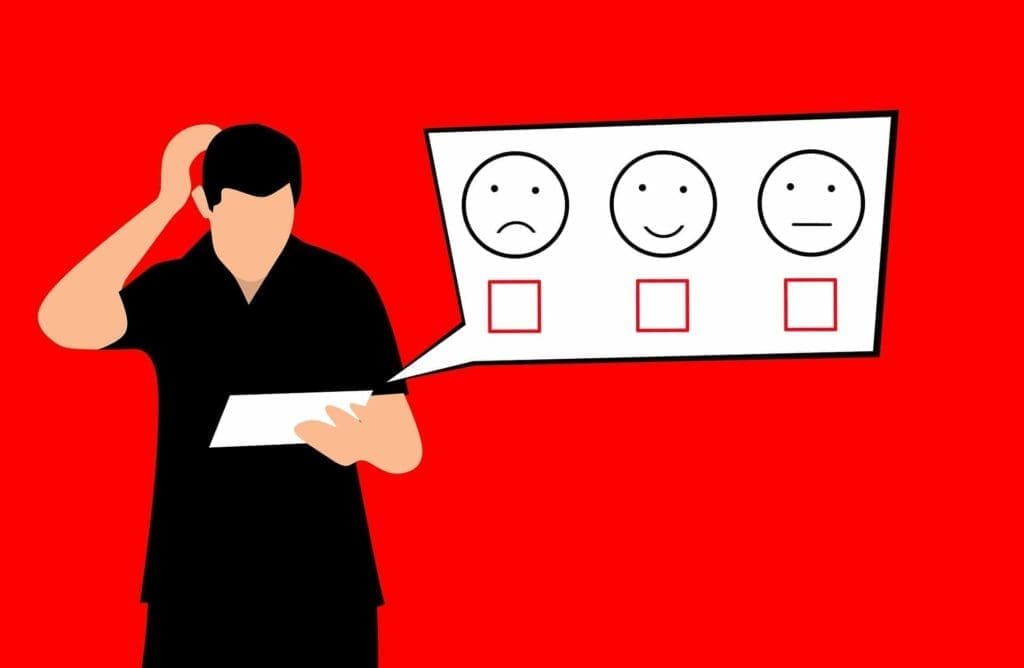Reputation mistakes are bound to occur. However, what can you do know to catch these warning signs before a brand crisis emerges?
Growing a business has always been challenging, but in the internet era, it’s even more difficult. On one hand, you have a big advantage over companies in the past because your marketing can reach further than ever.
On the other hand, your reputation reaches further than ever as well – and it doesn’t take much to topple it. Angering a group of online activists can quickly turn a minor faux pax into a major business crisis.
Online reputation management is an area all business leaders need to manage carefully. The good news is that you can keep your business squeaky clean online – as long as you avoid embarrassing reputation management mistakes.
Request a Free Consultation
What is Online Reputation Management?
Online reputation management is the ongoing process of creating and maintaining your company’s image online. You need a digital public image that’s mostly positive, without squashing or ignoring negative reviews.
You want someone who searches for your company or products to find your brand near the top. They should discover a variety of excellent reviews that show your businesses in a great light and puts your best foot forward.
You also want to share stories about the good things your company does, from charity donations to community service. These stories are shared by social media and local news outlets and help boost your overall reputation.
By encouraging positive reviews and sharing positive information about your business, you can build and keep a great online reputation.
Why is Reputation Management Important?
Why should you care about online reputation management? After all, people are going to say what they want, right?
Not necessarily.
It’s always been important to maintain a positive brand image. Companies have done it for decades, pushing positive stories into the papers and encouraging customers to share word-of-mouth stories about good results.
Today, a single online post or reputation mistake can spread like wildfire. Where in the past your reputation might have been local, today it’s worldwide. Your reputation can be tarnished in the eyes of thousands of consumers in a single hour.
Because information moves so quickly – and the impact of a bad reputation can be lawsuits and financial ruin – companies are allocating more resources toward online reputation management than ever before. In fact, 42% of companies monitor their online reputation daily.
You can manage your online reputation using a variety of tools, from social media listening to a review and referral program. The biggest step you can take, however, is to avoid these reputation management mistakes.
Reputation Mistake #1: Getting Angry About Negative Reviews
A negative review can impact your online reputation, but a single negative mark won’t hurt as much as you think. In fact, having nothing but 5-star reviews makes it look like your company is buying reviews or suppressing negative experiences.
The one thing that can make a single negative review turn into a crisis is your responsibility. If you become angry or aggressive, the negative review and your response are likely to be shared by others. This can result in a huge hit to your standing online.
The good news is that if you respond to customer reviews – good or bad – your overall ratings increase. Respond politely to a negative review, apologize (even if you did nothing wrong), and offer to take the issue offline for resolution.
This chef, for example, turned a minor issue into a major debacle. A food reviewer with a small blog and Twitter following wrote a review about the chef’s restaurant that wasn’t favorable. The chef called him out on Twitter, leading to a huge firestorm with people on both sides.
As a result? A negative review that might have been seen by a couple of hundred people at most was covered in The Guardian, The Telegraph, and The Daily Mail. Tens of thousands of people became aware of it – and the chef looked like a poor sport and a bully. Don’t make that mistake!
Request a Free Consultation
Reputation Mistake #2: Not Claiming Your Online Listings and Profiles
Reserving your Google My Business and other profiles are essential if you want to have control over your online reputation. If you don’t claim and fill these out, at best you’ll have little to no online presence in search.
At worst, someone who doesn’t like you or your business can claim it and fill it with misrepresentations of your brand. Or, Google may automatically generate information for you that’s incorrect, leading prospective customers to become frustrated and consider you unreliable.

You should also be sure to claim your name on important social media platforms, such as Facebook, Twitter, and Instagram. You want to make sure that the handle that is most likely to be associated with you is you. If it’s not, you have to spend a lot of extra effort driving people to an alternate profile.
There’s also the chance that someone who doesn’t like your company will claim a social media handle similar to your business name and use it to troll you or sully your name. Avoid the problems by claiming all of your profiles right away!
Reputation Mistake #3: Using Fake Reviews to Boost Your Reputation
Unfortunately, there are companies that don’t have the patience or integrity to take the time to build a strong online reputation. Instead, they try to buy good reviews from family, friends, or unscrupulous companies that sell five-star reviews.
The reality is that customers can see right through this. They don’t simply look at your overall five-star reviews.
When people see reviews that make no sense based on your products or services, they will definitely think less of your company and avoid you. The same thing will happen if people see reviews from names so odd they seem to be computer-generated or reviewers that have a history of oddball, nonsensical reviews.
Once your reputation is tarnished by a revelation of fake reviews, customers and prospects will rightly wonder what else you might be faking. It’s a huge hit to your business and one you may never fully recover from.
Also, if Google discover fake reviews, they may remove your listing or label your account with a consumer alert. Obviously that ruins the boost you were trying to get!
Instead, focus on providing a great product or service and encourage real customers to leave reviews. Over time, you’ll build an online reputation that’s genuine and mostly positive – exactly what you need to succeed.
Reputation Mistake #4: Using Negative SEO
One mistake that will embarrass your company a great deal is getting caught using negative SEO.
What is negative SEO? It’s when you use search engine optimization (SEO) strategies against your competitors to damage their website ranking. Instead of focusing on building your own reputation, you try to damage a competitor.

Sometimes this includes getting spammy sites to link to a competitor, hoping Google will downgrade them. Other times a company will take a competitor’s content and copy it to a variety of other sites, confusing Google as to which website is actually relevant. Or, someone may hack a site and put invisible negative content in the HTML code.
Needless to say, these attacks are petty and lack integrity. Damaging a competitor to boost your own profile isn’t reputation management. It’s simply unprofessional and will damage your business’s reputation.
Reputation Mistake #5: Ignoring Online Comments or Questions
Many business owners are used to customers or prospects calling them or sending an email with questions or concerns. However, these interactions are increasingly happening over social media.
60% of millennials prefer to use social media to share concerns and complaints. It isn’t just millennials, either – 47% of all customers address customer service problems online. This means that when you get a social media notification or mention, it’s vital to check it right away and see what is being said.
Responding to feedback and complaints in real-time on social media has a big positive impact on your online reputation. As long as you keep your cool and resolve things fairly, you’ll not only help a customer but you’ll also impress everyone else who is watching the interaction.
Getting no response to a complaint is frustrating to everyone, and you can lose a lot of customers permanently if you don’t reply. Don’t forget that your competitors are watching as well – they may swoop in and suggest themselves as an alternative if you aren’t responsive!
Don’t let automated posts be your only online activity. Instead, be sure to interact live with followers and share your humor, personality, and professionalism.
Request a Free Consultation
Reputation Mistake #6: Giving Social Media to Unqualified Employees
Some of the biggest social media mistakes come from letting overworked or unqualified employees handle your social media channels. Too many companies consider online platforms to be a place for “the younger folks” or allow interns to run the accounts.
Unfortunately, someone who isn’t experienced with your business – or in life – may overreact or fail to preserve your company voice during online interactions. Even social media platforms themselves make serious mistakes, like Snapchat’s decision to show an ad for a “Would You Rather” game that made light of a well-known domestic abuse case. Snapchat reviews all ads but said this one was “approved in error.”

The backlash over that error cost the company £650m, and it was all because someone wasn’t careful enough in doing their job.
Don’t let this happen to your company – be sure that the person in charge of your online presence is experienced, professional, and has enough time to devote to maintaining your online reputation.
Reputation Mistake #7: Being Inconsistent in Your Online Presence
What happens when prospects and customers are able to find your online profiles but there haven’t been any updates or posts in months – or years?
Simple – they assume your company has gone out of business!
With so many bankruptcies making the news, that’s not an unfair assumption. But obviously it’s going to damage your reputation and your ability to connect with prospects and customers.
This doesn’t mean you have to post constantly on every social media platform. However, it’s important that the ones you aren’t using aren’t public, or that they have a “coming to [platform] in the near future” message. Do what you can to avoid having your social media presence look like a ghost town.
Also, be sure that your brand voice and content is consistent across platforms. If you’re silly and irreverent on Instagram, you don’t want to turn around and be stodgy and professional on Facebook. Wherever you exist online, be sure your posts “sound like your brand.” That doesn’t mean you can’t be more reserved in some places than others, but the overall vibe should be very similar.
When someone finds your social media profile, they should know from the content that it’s you!
Reputation Mistake #8: Making Your Online Presence All About You
Who’s the worst person to talk to at a party?
The one who won’t stop talking about themselves! Maybe they just had an amazing European vacation, their kid got into Harvard, and their wife won an Emmy. Well, that’s nice, but folks don’t want to hear you brag about it.

People feel the same way online. Remember that social media is social. You want to have the same good manners online that you’d have at a party or other get-together.
As a business, in particular, you need to draw people to you. The best way to attract others is to talk about them. Discuss their problems and how they can be transformed into who they want to be. Your products and services should be mentioned as an aid to their journey, not the main event.
Take Steps to Protect Your Online Reputation
These eight mistakes aren’t the only problems that companies have with their online reputation, but they are some of the most common and embarrassing. Now that you know them, you can avoid them yourself.
When you’re working with online reputation management, remember to keep things positive. Don’t focus on running down competitors or trying underhanded techniques to damage them. Instead, build up your own company, provide excellent products and services, and encourage great reviews.
When you focus on being the best you can be while interacting and building relationships online, you won’t have to worry about reputation management mistakes. Put your company’s best foot forward and excel!

